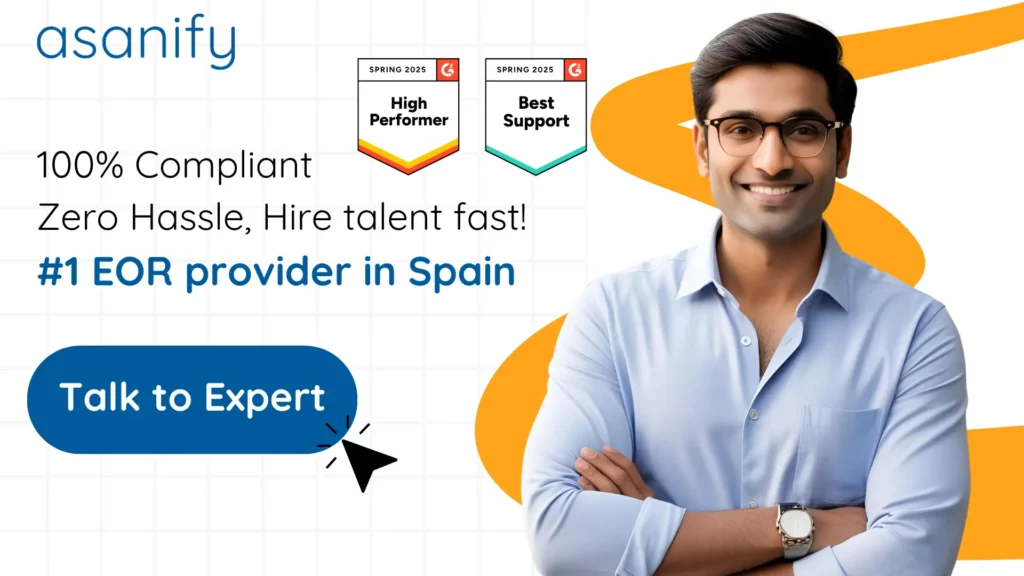Expanding your business into Spain offers access to one of Europe’s most vibrant economies, with strong sectors in tourism, renewable energy, technology, and manufacturing. However, before hiring in Spain, employers must understand the country’s work authorization system. Securing the correct work permit and visa for non-Spanish employees is essential for complying with immigration laws and ensuring a smooth onboarding process.
Navigating these requirements can be challenging, as they vary depending on the employee’s nationality, occupation, and intended stay. Employers must prepare complete, accurate documentation and follow the official application timelines. Partnering with immigration specialists or an Employer of Record (EOR) can help simplify the process, reduce administrative burdens, and ensure compliance.
Table of Contents
- Overview of Spain’s Work Permit and Visa System
- Understanding Requirements and Eligibility
- Who Needs a Work Permit in Spain
- Key Conditions for Obtaining a Spanish Work Visa
- Employer and Employee Eligibility
- Types of Work Visas in Spain
- Comparing Spanish Work Visa Types
- Advantages of the Highly Qualified Professional Visa
- Application Process for Employers
- Required Documents
- Processing Timelines
- Employer Responsibilities and Compliance
- Consequences of Non-Compliance
- Maintaining Ongoing Compliance
- Tips for a Smooth Application Process
- How an Employer of Record Can Help
- How Asanify Can Help
- FAQs
Overview of Spain’s Work Permit and Visa System
Spain operates a regulated immigration system, with rules varying by nationality, job type, and duration of employment. While citizens of the EU/EEA and Switzerland can work freely under the EU’s freedom of movement agreements, most non-EU nationals must obtain a work and/or residence permit before starting employment.
Key points:
- EU/EEA/Swiss citizens – No work permit required.
- Non-EU nationals – Must obtain a work permit and residence visa before beginning employment.
- Employer sponsorship – Employers usually initiate the application process with Spanish immigration authorities.
- Combined Work and Residence Authorization – For stays over 90 days, both permissions are handled together.
- Highly Qualified Professional Visa – A fast-track route for skilled workers employed by large companies or in strategic sectors.

Understanding Requirements and Eligibility
Non-EU/EEA/Swiss nationals require prior work authorization to be employed in Spain. This may be a separate work permit, a combined work and residence permit, or entry under a specialized scheme such as the Highly Qualified Professional visa or EU Blue Card.
Who Needs a Work Permit in Spain
- Required: Most non-EU/EEA and non-Swiss nationals.
- Exempt: EU/EEA and Swiss citizens under free movement rights.
- Special cases: Short-term business visits or specific professional categories may have exemptions or different rules.
Key Conditions for Obtaining a Spanish Work Visa
Applicants typically must:
- Have a confirmed job offer from a Spanish employer.
- Meet salary thresholds set by Spanish immigration law (varies by permit type).
- Show proof of qualifications or relevant work experience.
- Have valid health insurance.
- Maintain a clean criminal record.
Employer and Employee Eligibility
Employers:
- Must prove the role cannot be filled by a Spanish/EU worker (Labor Market Test), unless exempted.
- Must be registered and compliant with Spanish labor and tax regulations.
Employees:
- Must meet role-specific qualification requirements.
- Must satisfy visa category conditions, which may include salary minimums or industry-specific needs.
Suggested Read: Comprehensive Guide to Employee Tax Optimization for EOR in Spain
Types of Work Visas in Spain
Spain offers various work authorization routes depending on the job type, skill level, and duration:
- General Work Permit (Cuenta Ajena) – Standard work authorization tied to a specific employer.
- Highly Qualified Professional Visa – For skilled workers with high salaries in strategic sectors.
- EU Blue Card – For highly qualified non-EU professionals meeting EU-wide criteria.
- Intra-Corporate Transfer Permit – For managers, specialists, and trainees transferred within multinational companies.
- Seasonal Work Permit – For temporary work in agriculture, tourism, and hospitality.

Comparing Spanish Work Visa Types
| Visa Type | Purpose | Duration | Notes |
| General Work Permit (Cuenta Ajena) | Standard employment | 1–2 years | Employer-specific, renewable |
| Highly Qualified Professional Visa | Skilled roles in strategic areas | 1–2 years | Faster processing for eligible employers |
| EU Blue Card | Highly qualified roles | 1–4 years | EU mobility rights, high salary threshold |
| Intra-Corporate Transfer Permit | Company transfers | 1–3 years | For managers, specialists, trainees |
| Seasonal Work Permit | Temporary seasonal jobs | Up to 9 months | Agriculture and tourism sectors |
Advantages of the Highly Qualified Professional Visa
This visa is a top choice for employers needing to bring in skilled talent quickly.
Benefits include:
- Fast-track processing.
- Reduced labor market testing requirements.
- Pathway to long-term residency.
- Family members can join and work.
Application Process for Employers
- Job Offer – Employer issues a formal employment contract.
- Work Authorization Request – Employer submits the application to the Provincial Immigration Office.
- Visa Application – Employee applies for the visa at a Spanish consulate in their home country once authorization is approved.
- Arrival & Registration – Employee registers with the local town hall and applies for a Foreigner Identity Card (TIE).
Required Documents
- Signed employment contract.
- Valid passport.
- Proof of qualifications or work experience.
- Health insurance documentation.
- Criminal record certificate.
- Completed application forms and proof of payment of fees.
Processing Timelines
- Highly Qualified Professional & EU Blue Card – Often processed in 2–6 weeks.
- General Work Permits – Typically 1–3 months. Processing times depend on the permit type, completeness of the application, and local immigration office workload.
Employer Responsibilities and Compliance
Employers must:
- Ensure foreign hires have valid work and residence authorization.
- Maintain accurate employment records.
- Notify authorities of any changes in the employment relationship.
- Pay salaries in compliance with Spanish labor law.
Consequences of Non-Compliance
- Significant fines.
- Loss of eligibility to sponsor work permits.
- Criminal penalties for serious breaches.
Maintaining Ongoing Compliance
- Monitor work permit and visa expiry dates.
- File renewals on time.
- Keep contracts and pay records compliant with Spanish law.

Tips for a Smooth Application Process
- Begin applications early.
- Use complete and accurate documentation.
- Partner with an EOR to speed up hiring and ensure compliance.
How an Employer of Record Can Help
Partnering with an Employer of Record (EOR) in Spain allows companies to legally employ foreign talent without setting up a Spanish legal entity. The EOR becomes the official employer, managing payroll, benefits, HR compliance, and immigration processes on behalf of the hiring company. This approach reduces administrative burdens, accelerates hiring, and ensures full compliance with Spanish labor regulations.
Additionally, EOR providers draft and manage employment contracts in accordance with Spanish labor laws, minimizing the risk of legal disputes. They also handle work permit and visa applications, ensuring a smooth and timely onboarding process for international employees. By leveraging an EOR, businesses can focus on operations and growth while leaving complex employment compliance in the hands of local experts.
Suggested Read: Understanding Labour Laws in Spain
How Asanify Can Help
Navigating Spain’s work authorization process can be complex, especially for businesses hiring internationally. Asanify provides an all-inclusive Employer of Record (EOR) solution that simplifies hiring and workforce management in Spain.
Our services cover everything from securing the right work permits to payroll management and employee benefits—ensuring you remain fully compliant with Spanish labor and immigration laws without the need to establish a local entity.
With Asanify, you can:
- Hire and onboard foreign talent quickly without administrative delays
- Ensure compliance with all national labor and immigration regulations
- Expand into Spain without the cost and complexity of creating a local company
If your objective is to grow your team in Spain efficiently, Asanify’s expertise and end-to-end services make the process seamless.
FAQs
Usually 1–2 years, depending on the permit type, with renewals possible.
Typically €60–€200, depending on the permit category.
Yes, if their visa allows the activity.
A process to verify no local/EU candidates are available before hiring a non-EU worker.
Yes, particularly for Highly Qualified Professional visas and the EU Blue Card.
Yes, most long-term permits allow dependants to join.
The employee must stop working unless a renewal is approved.
To simplify compliance, payroll, and immigration without opening a local entity.
Not to be considered as tax, legal, financial or HR advice. Regulations change over time so please consult a lawyer, accountant or Labour Law expert for specific guidance.

